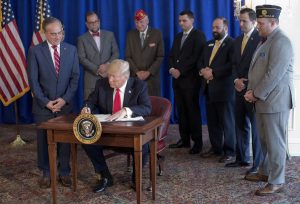
President Trump may be wrong on many things, but he is absolutely correct about reforming the Department of Veteran’s Affairs. Here’s why.
Since the 2000s, there have been notable, ongoing scandals surrounding the U.S. Department of Veterans Affairs (VA) hospitals nationwide. One of the Trump administration’s biggest focuses, and one of the issues for which the administration has followed through on its promises, is VA reform. At rallies, it has been a consistent point of discussion for President Trump, to which his supporters have responded very positively.
At a rally in Nevada a few months ago, upon signing a bill to shorten the amount of time that veterans wait for decisions on requests for their disability payments and electing a new VA Secretary, Trump proudly proclaimed, “Now you [veterans] have a true reformer in [VA] Secretary David Shulkin. He’s done an incredible job. We are publishing wait times online for every VA facility so you know what the wait is.”
Republicans have depicted the VA as an agency with many terrible problems and have long campaigned on reform. Are they right? Could the VA really be in as terrible shape as they claim? To answer this question, let’s take a look at some specific experiences veterans have had with the VA:
In 2009, CBS News published a report revealing that, according to VA officials, “16 patients exposed to contaminated equipment at its medical facilities [had] tested positive for viral infections, including hepatitis.” Sites in Tennessee, Miami, and Georgia failed to properly clean their equipment in between different patients’ treatments. This instilled fear in many patients, such as veteran Gary Simpson, 65, who received a colonoscopy at a clinic in 2007 but continued to live in fear after being told by a nurse that it could take up to seven years for a disease to appear.
Also in 2009, according to a 2014 report from MSNBC, Vietnam Veteran John Renegar Jr. was one of thousands of patients to receive a letter warning that he might have been exposed to fatal infections as a result of “misconfigured or unclean colonoscopy equipment.” Specifically, Mr. Renegar was also a member of a smaller group who later tested positive for chronic hepatitis, which left him at a permanent risk for life-threatening liver damage. Mr. Renegar told MSNBC, “It just makes you think you don’t mean nothin’ to anybody, you know. You served a country, but you don’t mean anything to her.”
A few years later, a federal court in Miami awarded substantial amounts of money to two male veterans who allegedly contracted hepatitis C and HIV, respectively, during their colonoscopies at a VA medical center in Miami.
Furthermore, in 2011 and 2012, six or more veterans treated at a Pittsburgh VA died due to an outbreak of Legionnaires’ disease, a very rare and severe form of pneumonia most often spread by inhaling the bacteria. In a 2013 report, it was announced that 52 South Carolinians developed cancers that were reportedly associated with delays in diagnosis and treatments. These delays have been one of the main controversies surrounding VA medical centers.
In 2014, up to 40 patients died at a Phoenix VA hospital while allegedly waiting for care. This particular scenario sparked national outrage and led to the resignation of the VA Secretary at the time, Eric Shinseki. This past week, the chief of surgery for a VA Medical Center in Oregon stepped down upon recent allegations of retaliation and bullying.
Clearly, there has been and still is a major need for reform to help solve VA’s numerous systemic issues. Years before President Trump ran for office, he tweeted his dismay with the former state of VA and expressed his eagerness to fix it. His 2015 tweet reads:
One of the reasons I am no fan of John McCain is that our Vets are being treated so badly by him and the politicians. I will fix VA quickly.
— Donald J. Trump (@realDonaldTrump) July 18, 2015
Since the start of his presidency, President Trump and his administration have surely taken strong actions to address the VA scandal. To express his frustration with the state of the VA and justify his support for reform, the president declared: “Many veterans died waiting for a simple doctor’s appointment. What happened was a national disgrace, and yet some of the employees involved in these scandals remained on the payrolls. Outdated laws kept the government from holding those who failed our veterans accountable.”
He also tweeted his support for a particular piece of legislation in a tweet, pictured below:
The passage of the @DeptVetAffairs Accountability and Whistleblower Protection Act is GREAT news for veterans! I look forward to signing it! pic.twitter.com/xNSEW7N3zd
— Donald J. Trump (@realDonaldTrump) June 13, 2017
In June 2017, as referenced in this tweet, President Trump signed a piece of legislation that gives VA officials more power to fire employees who have failed the department, in hopes of increasing accountability. This legislation, fittingly named the Department of Veterans Affairs Accountability and Whistleblower Protection Act, gives the VA Secretary the power to fire employees who break department rules, and also increases whistleblower protections. While veterans issues tend to be less partisan, this act garnered extreme bipartisan support, winning a 368-55 vote in the House and a unanimous voice vote in the Senate.
Other efforts from President Trump’s administration toward VA reform include a VA budget increase proposal, a veterans’ hotline, access to private health insurance for veterans, and the “Forever GI” Bill that provides educational assistance to veterans and their families. While not all of these efforts have proven to be fully successful thus far, Trump is taking several measures in hopes of systemically reforming VA.
Based on the countless publicized VA scandals that have occurred across the nation over a span of many years, along with the lack of firm legislative and executive action taken in efforts of addressing these issues despite the widespread recognition of and contempt for them, I believe that the president’s strong pro-VA reform stance is warranted and necessary. With that said, it is crucial that he is careful to help craft and ultimately sign realistic, sustainable plans. The significant amount of veterans who have died due to VA conditions, as well as those who have self-reported infection, fear, and anger caused by VA medical centers, are reason enough to show how important it is to reform the VA.
Adam Seltzer studies social sciences and business at the University of Michigan.










